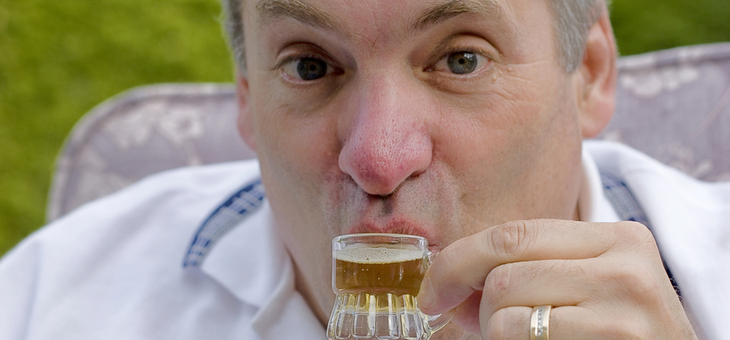Those who believe in the benefits of alcohol be warned – anything more than moderate drinking is ill advised. But, if you can maintain that monkish regime of literally one or two per day, there is good news to be found.
“Moderate and occasional drinkers had lower death rates than abstainers,” says medicalnewstoday, analysing America’s large scale Health and Retirement Study.
Getting a taste for this?
In 2014, researchers at the universities of Texas, Kentucky and Maryland found “for people 60 and older who do not have dementia, light alcohol consumption during late life is associated with higher episodic memory – the ability to recall memories of events”.
Should we have another?
The Mayo Clinic says moderate alcohol use might:
- reduce your risk of developing and dying of heart disease
- possibly reduce your risk of ischaemic stroke (when the arteries to your brain become narrowed or blocked, causing severely reduced blood flow)
- possibly reduce your risk of diabetes.
While we’re bingeing on the good news …
Harvard Health says moderate drinking can reduce the risk of gallstones and confirmed that: “Light drinkers (those consuming one to three drinks per week) had the lowest rates of cancer or death compared to those drinking less than one drink per week.”
Let’s have one more.
NBC news excitedly lists the following as positive attributes of beer: stronger bones, boosted brain power, cleaner teeth, reduced inflammation and increased longevity.
A nightcap?
This Healthline article informs us hops have been used in herbal medicine since before the 1500s, and beer contains antioxidants, phosphorus, calcium, potassium, manganese, calcium, fluoride and silicon.
One for the road?
Piedmont Healthcare points out that researchers found two glasses of beer “can reduce work-related stress or anxiety”.
I think we’ve had enough …
Read on further in the same article and it states: “… routinely turning to alcohol to help cope with stress may do more harm than good. While alcohol may help with stress reduction in the moment, in the long run it can contribute to feelings of depression and anxiety, making stress harder to deal with.”
While it’s fun to think drinking can be good for you, there are devils in the detail. Most of the studies espousing positives for beer and other alcohol don’t fully consider the socio-economic status (SES) of research subjects. Moderate drinkers from a higher SES are “more likely to get mammograms, more likely to do regular physical activity, have healthier diets and live in better zip codes”, according to Richard Saitz, primary care internist and professor at Boston University Schools of Medicine and Public Health.
Dr Robert Shmerling, from Harvard Health, says there are other “important limitations” to research on alcohol consumption. They rely on “self-reporting, do not analyse binge drinking, do not assess alcohol consumption over a lifetime, or do not account for the fact that some study subjects may reduce their alcohol consumption due to alcohol-related health problems”.
And Dr Shmerling is being balanced; unlike many compatriots, he recognises the intangible benefits of drinking.
“While the list of health risks related to excessive alcohol consumption is long, there may also be health benefits associated with moderate drinking. There’s the psychological or social impact of alcohol. Having a drink while getting together with family or friends can be helpful to relieve stress and promote a sense of wellbeing. Alcohol has long been considered a ‘social lubricant’ because drinking may encourage social interaction. These benefits are hard to measure.”
In the end, each adult must make the choice, based on the knowledge that only moderate drinking is safe (and possibly slightly physically beneficial).
Non-profit AARP cuts to the chase(r):
“The bottom line: An occasional drink is fine, but don’t kid yourself that it’s medicinal.”
Booze after age 65, according to the Cleveland Clinic:
- Your circulation slows down. “Less blood is flowing through your liver, so the process slows …” says family medicine specialist Dr Donald Ford. This means toxins accumulate.
- You feel more from less. The loss of lean muscle mass means a higher concentration of alcohol remains in the bloodstream. “So, you feel more effects from the same amount of alcohol.”
- Alcohol negates medicines. Alcohol competes with medicines for processing by your liver – and wins. As a result, sedatives become “far more potent” and blood pressure medications stop controlling hypertension, increasing the risk of stroke.
- You can’t sleep on it. Booze “compounds” any sleep problems, which are common in this age group.
Are you a safe drinker? Are you less likely to monitor your drinking as each year passes?
If you enjoy our content, don’t keep it to yourself. Share our free eNews with your friends and encourage them to sign up.
Related articles:
Alcohol more toxic than you think
Could I be classed an alcoholic?
What booze does to your brain and body
Disclaimer: This article contains general information about health issues and is not advice. For health advice, consult your medical practitioner.

